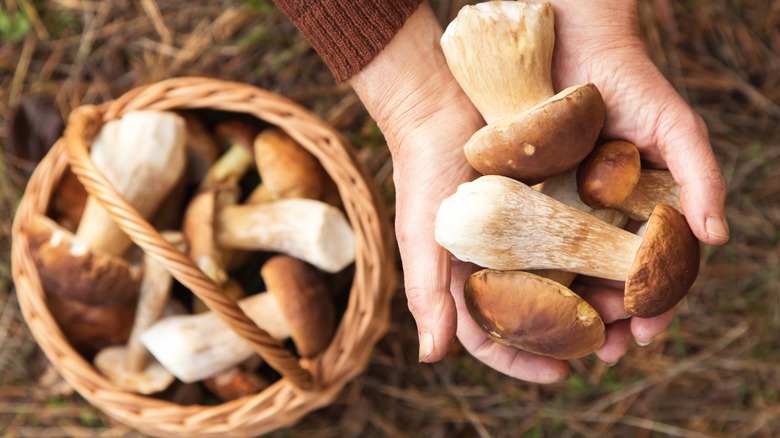Why You Should Be Eating This Protein-Packed Fungus
Just the word "fungus" can make people squirm. You could think about the mildew that grows on your shower curtain or the mold on those leftovers you forgot were in the refrigerator. Anyone who's had athlete's foot or a yeast infection knows that some fungi can itch. While it might sound crazy to think about eating fungi, you've probably eaten some by choice, at one time or another. After all, mushrooms are a species of fungus.
While there are thousands of varieties of edible mushrooms, you're probably most familiar with the white button, portobello, shiitake, oyster, and cremini mushrooms. Even though white button, portobello, and cremini mushrooms look different, they are simply different ages of the Agaricus bisporus mushroom (per Eater). Regardless of what type of mushroom you choose, they pack a lot of protein per calorie. A cup of white mushrooms has 21 calories and 3 grams of protein, which means 57% of the calories come from protein. But you'll want to eat this protein-packed fungus for its nutritional and medicinal benefits.
Nutritional benefits of mushrooms
Not only do mushrooms rank just behind meat in terms of protein, but their amino acid profile is also similar to that of meat, with all nine of the essential amino acids (per a 2017 article in the Journal of Microbiology, Biotechnology and Food Sciences). While portobello mushrooms aren't a great source of carbs, the fiber in this fungus has chitin and beta-glucans that make them particularly healthy. Chitin is a type of fiber found on the wall of the mushroom that can regulate the immune system, according to a 2018 article in Clinical Reviews in Allergy & Immunology. Beta-glucans can also support the immune system and prevent cholesterol from food from being absorbed by your body (per WebMD).
Overall, mushrooms don't have much fat, but they do have linoleic acid, which is an essential fatty acid. Per Harvard School of Public Health, linoleic acid can reduce cholesterol and blood pressure. Mushrooms are good sources of minerals, particularly potassium and phosphorus. You'll also find vitamins such as niacin and riboflavin.
The healing power of mushrooms
Many of the substances in mushrooms can heal many chronic conditions. The beta-glucans in mushrooms have been found to protect the body against cancer, according to a 2017 article in Current Opinion in Food Science. Grifolan, a beta-glucan extracted from maitake mushrooms, has been shown to fight gastrointestinal, lung, liver, and breast cancers.
Because white button mushrooms are rich in polyphenols, folates, and dietary fiber, they could control diabetes and cardiovascular disorders, per a 2021 article in Applied Science. The extracts from these mushrooms have increased insulin production and reduced glucose concentration in rats. Phytosterols extracted from white button mushrooms reduce LDL cholesterol and plasma cholesterol, which can reduce cardiovascular disease risk.
Mushrooms might also be associated with a lower risk of dementia. According to a 2017 article in the Journal of the American Geriatrics Society, people who ate mushrooms one to two times a week had a modest reduction in their risk of dementia. Eating mushrooms three or more times a week was linked to an even lower risk of dementia.


